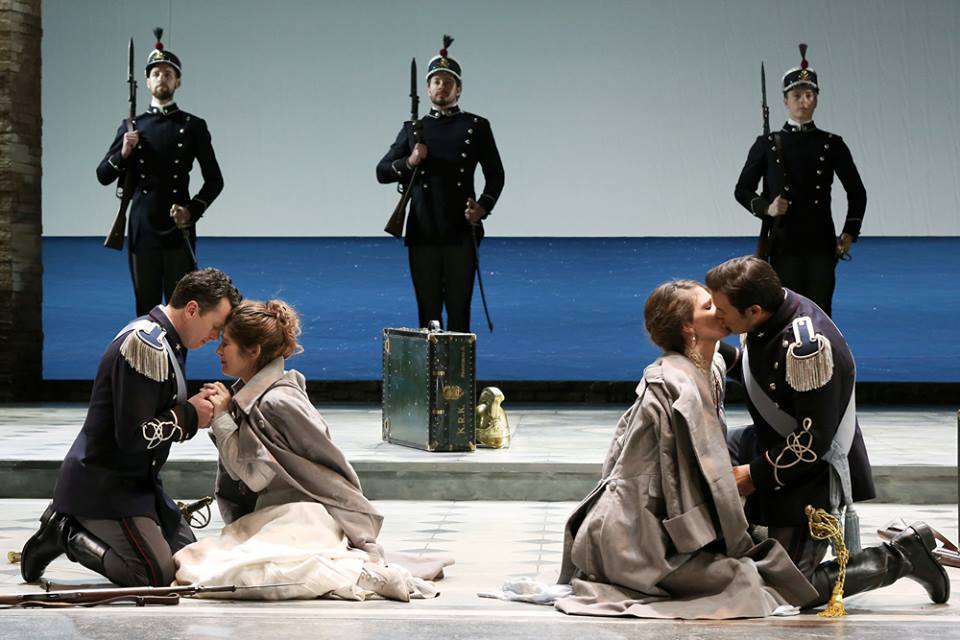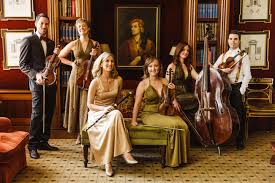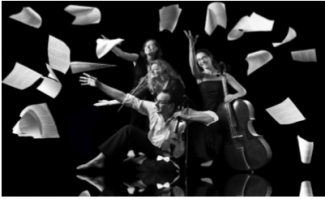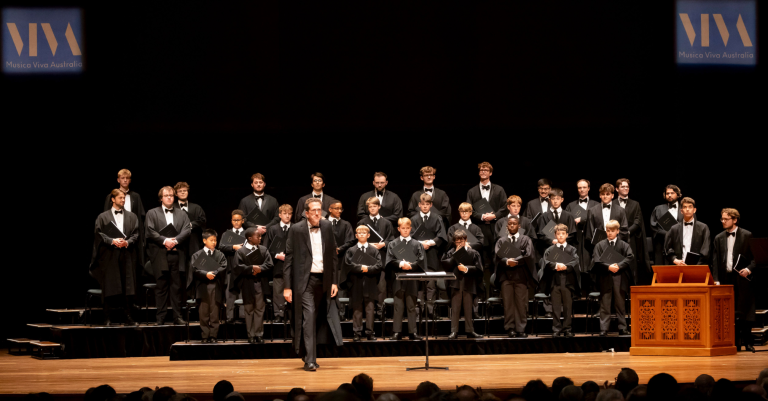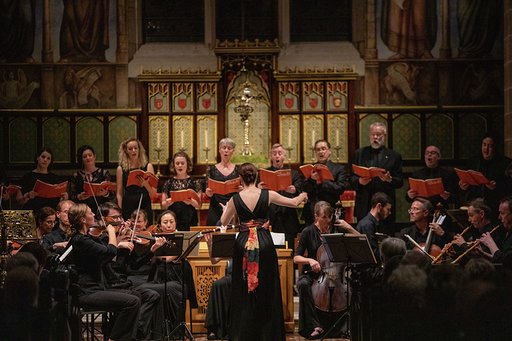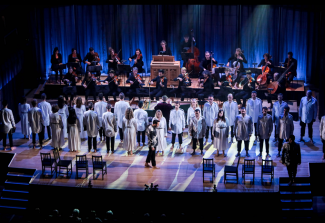Opera Review: Così fan tutte/ Opera Australia
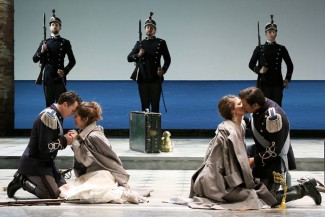
Photo by Prudence Upton.
Così fan tutte – Mozart
Opera Australia, Joan Sutherland Opera Theatre, Sydney Opera House,
19 July 2016
Several years ago Opera Australia commissioned the Scottish director Sir David McVicar to direct the three Mozart/Da Ponte operas over three years. Don Giovanni was premiered in 2014, The Marriage of Figaro appeared last year and this year it is the turn of Così fan tutte.
McVicar’s primary concern as an opera director is to emphasise the dramatic narrative while recognising the fundamental importance of the music. This was emphasised in the two previous productions which raised high expectation for this new Così, and fortunately these expectations were amply fulfilled. In positioning his singers on stage McVicar arranges their placement so they can project into the auditorium without strain. Even in ensemble numbers a singer with an important few bars is often subtly engineered to the front of the stage to deliver that section. This is music drama direction at its finest.
For this production, the opera is set in the twilight years of the European old order just prior to World War I when the established social structure was about to crash. The shift of time period convincingly conveys the veneer of moral rectitude and military gallantry that are central to the libretto.
In a note on the cast-list McVicar writes of ‘an age of innocence and elegance on the brink of being shattered, as the lives of the four lovers in the comedy ultimately are’. This underlies his concept of the opera. While not devoid of humour, this is a black comedy.
The sets and costumes by Moritz Junge focus attention on the drama, rather than drawing attention to themselves. The set is uncomplicated and uses sliding panels to glide from one scene to the next with a minimum of disruption. The costumes are typical of the pre-World War I period. For once, the transformation of the soldiers into Albanian lovers disguises them sufficiently for us to concede the vague possibility that the ladies may not recognise them. The lighting of David Finn is subtle and very effective; it greatly enhances the visual aspects of the production.
Musically, this is ensemble opera at its finest. The individual singers are all excellent and, with one exception, they are all Australian and have been regular performers with the company. This is evident in the dramatic integration and musical cohesiveness, especially in the ensemble numbers such as the Act 2 quartet. The enchanting trio Soave sia il vento received a magical performance with Nicole Car floating effortlessly on top, supported by an exquisitely delicate, pulsing accompaniment from the orchestra.
Nicole Car sang Fiordiligi in a performance that underlined, once again, why she is acquiring such a growing international reputation. Her delivery of the notoriously difficult Come scoglio was of text-book accuracy. It was delivered without histrionics, but with a smouldering intensity of self-righteousness. Her Act 2 aria Per pietà displayed her control of slow, soft singing throughout an extended range, with some heart-stopping pauses. It was superb singing.
Anna Dowsley has only recently been given major roles with the company and she more than justifies her casting as Dorabella. In her challenging Act 1 aria Smanie implacabile she surmounted the technical challenges and delivered it with appropriate fire and energy. Throughout the performance her characterisation of the younger sister was finely graded as she discovered the new possibilities outside her confined world.
The American tenor David Portillo was making his debut with Opera Australia, and a welcome one it was, too. His voice is well suited to Mozart: clear, well projected and with a comfortable top register that showed no sense of strain. His delivery of Un’ aura amorosa was punctuated by intense silences which held the audience enthralled, In Act 2, his Tradito, schernito was biting and passionate.
Guglielmo was sung by Andrew Jones who is starting to return to roles with the company after a pause of several years. During the interim his voice has developed and is now a satisfying, rounded baritone. His second act aria Donne mie, sung directly to the audience, was well delivered and effectively projected Guglielmo’s growing disillusionment.
The ever-reliable Taryn Fiebig presented a Despina with many amusing details of characterisation. As required, she was worldly-wise but she also displayed genuine compassion. Her singing was fine throughout, with some exquisite pearls of briefly touched high notes. She successfully walked the fine line of being humorous in her two disguised roles without overdoing it.
The manipulator of the plot, Don Alfonso, was sung by Opera Australia stalwart, Richard Anderson. He sang well and characterised the role capably.
The musical director is the Canadian Jonathan Darlington who collaborated with McVicar in the new Don Giovanni production two years ago. In the first dozen bars of the overture, which he took quite slowly, he established an underlying mood of gravity which foreshadows the heartbreak with which the opera ends. The remainder of the overture was upbeat and taken at a sprightly pace in which the small Mozartian orchestra responded with incisive and disciplined playing. It was a pleasure to hear the overture so stylishly performed. Throughout the performance Darlington was very considerate of the singers, keeping the orchestral dynamics down so as to ensure that they could be clearly heard. The downside of this, however, was that much of Mozart’s superb scoring, especially for the winds, only occasionally reached out into the auditorium – at least to my seat in row N of the stalls. The fortepiano continuo was played by Anthony Legge whose skilful timing helped propel the drama forward.
The chorus does not have a lot to sing in this opera, but they displayed their familiar hallmarks of blend and precise ensemble instilled by their chorus master Anthony Hunt. In this production they do not appear on-stage. This had no dramatic drawbacks; rather, it ensured that the visual focus remained on the six protagonists.
A point of interest in any new production of Così is how the director will pair the lovers at the conclusion of the opera. Will they revert to their original pairing, as the libretto implies, or will they remain with their new-found loves? McVicar veers towards the latter solution while revealing the total emotional devastation – especially for the women. As a further turn of the screw, Despina is desolate when she realises what she had abetted, and at the final curtain even the philosopher Alfonso finally comprehends the destruction he has wrought. A 21st century interpretation indeed.
In this brilliant production Opera Australia has the complete operatic package: fine ensemble singing, dramatic integrity and a staging that supports and enhances the drama. Not to be missed!
Performances of this new production continue at the Sydney Opera House until 13 August.
Larry Turner for SoundsLikeSydney©
Larry Turner is an avid attender of concerts and operas and has been reviewing performances for Sounds Like Sydney for several years. As a chorister for many years in both Sydney and London, he particularly enjoys music from both the great a capella period and the baroque. He has written programme notes for Sydney Philharmonia, the Intervarsity Choral Festival and the Sydneian Bach Choir and is currently part of a team researching the history of Sydney Philharmonia for its forthcoming centenary.

